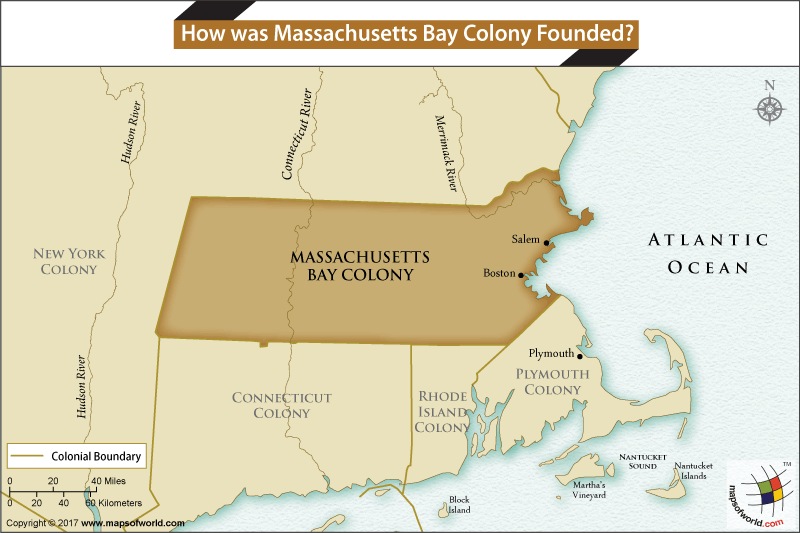

Map showing Massachusetts Bay Colony area in USA
In 1630, a group of puritan refugees from England marched their way toward North America under the leadership of John Winthrop. Their settlement took place in Massachusetts, and came to be known as the Massachusetts Bay Colony, and was founded by the Massachusetts Bay Company. This movement was better known as the ‘Great Puritan Migration.’ On March 4th, 1629, the Massachusetts Bay Company was granted a charter by King Charles I, to create a colony and start trade in New England. The settlers instead chose to transfer the wealth and trade to Massachusetts and turned a commercial move into a political one.
A fleet of 12 ships under Winthrop arrived in Salem and later moved to Charlestown, which is now modern-day Boston. This shift could be accredited to Winthrop’s friend William Blackstone, who invited the settlers to a nearby peninsula that was later named Boston, after the town they had left in England. By 1632, Boston was made the capital of Massachusetts, and by 1640 the total number of puritan settlers in Massachusetts had reached 15,000.
The Economy of the colony started to diversify and flourish when they found markets for fur trading, lumber, fishing, and shipbuilding, in Europe and the West Indies. Soon the colony saw the emergence of the slave trade in the 18th century, with merchants importing slaves from Africa.
In the coastal towns, the colonists made their living through fishing, whaling, and shipbuilding. Whale oil was a valuable resource as it could be used in lamps. Farming was difficult for crops like wheat because of the poor soil but corn, pumpkins, rye, squash, and beans were planted.
Beyond Massachusetts, two more colonies were established, in New Hampshire and Maine. Connecticut was formed as a migration from the Massachusetts colony only. The religion of the colony was primarily orthodox, as it was formed by puritans who strongly believed in the traditional belief of salvation from God. The Puritans were a reform movement in the Anglican Church that aimed at purifying the church of corruption. This religious orthodoxy had stern rules and regulations, which were challenged at the time. Dorothy Talbye, Margaret Jones, and Mary Dyer were some of the more well-known persecutions from the ‘Salem Witch Trial,’ days at the colony. These executions ceased when King Charles II passes a law forbidding Massachusetts from executing anyone.
Until 1684, The Massachusetts Company and colony were the same but after the Charter was lost, they no longer remained as one. The Royal Charter was granted to Massachusetts in 1691, including the Plymouth Colony and Maine within Massachusetts.
In 1776 the General court declared that the Royal Governor Gage would no longer be in charge, but instead, the colony would be managing its affairs until the King appointed an accepted governor. The Colony became a State on February 6th, 1778, after battling the British at the Battle of Lexington and Concord. Some of the famous patriots of Massachusetts Bay Colony were; Paul Revere, Samuel Adams, and John Adams.
Massachusetts was the fifth of the original 13 colonies to become a state. The name Massachusetts originates from the Algonquian nation language, which means ‘at the great hill’ and can also be referred to the indigenous population which inhabited the colony.
Related Links:
Related Maps:
The Republic of Madagascar is an island country located in the Indian Ocean, off the…
The Euro is the official currency of the European Union. It is, however, not incumbent…
There are many countries or regions that are partially recognized by the UN, have disputes…
The Alaska Statehood Act was signed into law by President Dwight D. Eisenhower in 1958,…
The name Persia may, however, only be used to refer to Iran in some contexts.…
Hawaii is an Island State in the US. It is one of the 50 states…